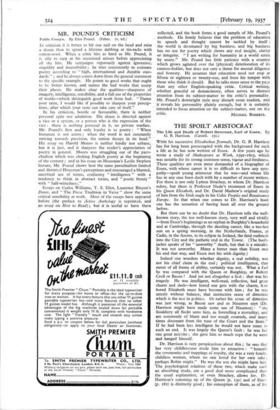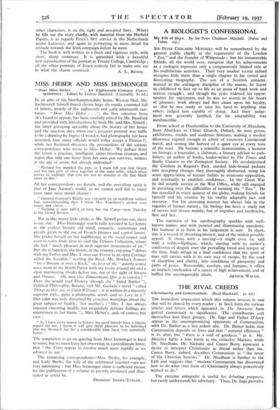THE SPOILT ARISTOCRAT
Wrril his successive Elizabethan Journals, Dr. G. B. Harrison has for long been preoccupied with the background for Such a life as he has now written of Essex. A few years ago he - wrote a study of Shakespeare at Work, 1592-1603, which was notable for its strong common sense, vigour and freshness. These qualities are even more demanded of a biographer of Essex, with whose career it is so difficult to have any sym- pathy—spoilt young aristocrat that he was—and whose life has in any case been dealt with by a number of recent writers. For there is not only Lytton Strachey, to whom Dr. Harrison refers, but there is Professor Neale's treatment of Essex in his Queen Elizabeth, and Dr. David Mathew's original study of him from the Irish angle in his Celtic Peoples and Renaissance Europe. So that when one comes to Dr. Harrison's book one has the sensation of having been all over the ground before.
. But there can be no doubt that Dr. Harrison tells the well- known story, the too well-known story, very well and vividly —from Essex's beginnings as an orphan in Burghley's household and at Cambridge, through the da771ing career, like a too-hot sun on a spring morning, in the Netherlands, France, at C-adiz, in the Azores, to its eclipse in Ireland, the fatal outbreak into the City and the pathetic end in the Tower. (The book- jacket speaks of his " unworthy " death, but that is a mistake. It was not unworthy. Many a better man than Essex met • his end that way, and Essex met his with dignity.) Indeed one wonders whether dignity, a real nobility, was not his chief claim in the end ; political intelligence, that rarest of all forms of ability, certainly was not. What a fool he was compared with the Queen or Burghley, or Robert Cecil or Bacon ! And yet not altogether a fool : that was his tragedy. He was intelligent, well-read, reflective, had great charm and dash—how bored one gets with the charm, how bored Elizabeth must have become with him ; for he was utterly without balance, that instinctive sense of direction which is the test in politics. Or rather his sense of direction was just wrong, as Bacon saw and as Naunton says (Dr.
Harrison might have made some use of Naunton) : "the Souldiery all flockt unto him, as foretelling a mortality; and are commonly of blunt and too rough counsels, and many times dissonant from the tune of the Court and the State." If he had been less intelligent he would not have come to such an end. It was largely the Queen's fault : he was her one great mistake ; she gave him so much rope that he went and hanged himself.
Dr. Harrison is very perspicacious about this ; he sees that her very childlessness made him so attractive : "beneath
the ceremonies and trappings a royalty, she was a very lonely,
childless woman, whom no one loved for her own sake ; perhaps Robin might." He was the son she might have had.
The psychological relations of these two, which make such an absorbing study, are a good deal more complicated than the usual explanation, or even Strachey, allows for. Dr.
Harrison's summing up of the Queen (p. ip) and of Essex (p. ilio) is distinctly good ; his conception of them, as of his
other characters, is on the right and accepted lines. Where he fills out the story chiefly, with material from the Hatfield Papers, is as regards Essex's first service in the Netherlands under Leicester, and again in portraying in more detail his attitude towards the Irish campaign before he went.
The book is well written in a fresh and vigorous style, with short, sharp sentences. It is garnished with a beautiful new reproduction of the portrait at Trinity College, Cambridge ; all the other portraits of Essex entirely fail to make one see















































 Previous page
Previous page